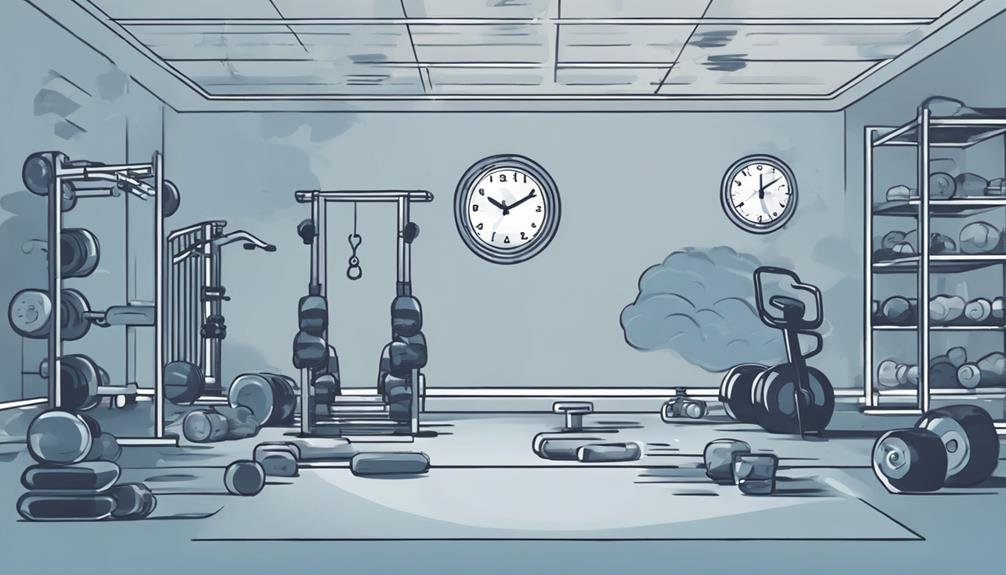10 Ways Fatigue Sabotages Your Workout Results
Fatigue can seriously sabotage your workout results in several ways. It slows muscle recovery, leaving you sore longer and increasing your injury risk. Your energy levels drop, making it harder to maintain intensity and focus during workouts. As motivation wanes, you might skip sessions or feel burdened by exercise. Hormonal imbalances from fatigue can disrupt your mood and appetite, while poor nutrition choices worsen the cycle. Finally, fatigue compromises your immune function, making you more susceptible to illness. Recognizing these signs is vital, and there's more you can do to turn things around.
Key Takeaways
- Fatigue slows muscle recovery, leading to prolonged soreness and increased injury risk, compromising future workout performance.
- Decreased energy levels from fatigue result in reduced workout intensity and slower reaction times, hindering overall effectiveness.
- Cognitive function declines with fatigue, causing distractions and poor decision-making during workouts, disrupting exercise routines.
- Hormonal imbalances caused by fatigue elevate cortisol levels, negatively impacting mood, appetite, and recovery, thus affecting performance.
Impact on Muscle Recovery
Fatigue directly affects your muscle recovery, slowing down the healing process and hindering your overall performance. When you push your body without adequate rest, your muscles struggle to repair the micro-tears caused by intense workouts.
This delay can lead to prolonged soreness and increased risk of injury. You might notice that your strength and endurance levels decline as your body battles fatigue, making it harder to achieve your fitness goals.
Sleep plays a significant role here; without quality rest, essential hormones responsible for muscle growth and repair, like testosterone and growth hormone, drop.
To optimize your recovery, prioritize rest days and make certain you're getting enough sleep. By doing this, you'll set your body up for better performance in future workouts.
Decreased Motivation Levels
When muscle recovery is compromised, it's common to experience a noticeable drop in motivation to work out.
You might find it harder to get excited about your fitness routine, leading to skipped sessions and less effort during workouts. This lack of drive can stem from several factors:
- Fatigue's grip: Exhaustion can make even the thought of exercising feel overwhelming.
- Diminished results: When you don't see progress, staying committed becomes a challenge.
Impaired Cognitive Function

Impaired cognitive function can make it difficult to focus on your workouts and stick to your routine. When you're fatigued, your brain struggles to process information and make quick decisions, impacting your ability to perform exercises effectively.
You might find it challenging to remember your workout plan or stay engaged during your session. This mental fog can lead to distractions, causing you to lose track of your sets or reps. Additionally, you may misjudge your limits, which can affect your overall performance.
To combat this, prioritize adequate rest and recovery, ensuring your mind is as sharp as your body. By addressing fatigue, you'll enhance your focus, allowing you to maximize your workout results and stay committed to your fitness goals.
Increased Risk of Injury
Pushing through workouts while exhausted greatly raises your risk of injury. When you're fatigued, your body can't perform at its best, making you more prone to accidents. You might overlook proper form or miss vital cues from your body, leading to potential setbacks.
Here are some specific risks you should consider:
- Muscle Strains: Tired muscles are less flexible and more likely to tear.
- Joint Injuries: Fatigue can diminish your balance and coordination, increasing the chance of falls.
Listen to your body. Prioritizing rest and recovery is essential to avoid injuries and guarantee long-term success in your fitness journey. Don't let fatigue derail your hard work!
Hormonal Imbalances

Fatigue can lead to hormonal imbalances that disrupt your body's natural functions and hinder workout results. When you're tired, your cortisol levels may rise, increasing stress and making it harder for you to recover after workouts.
Low energy can also drop your testosterone and growth hormone levels, vital for building muscle and losing fat. This imbalance may not only impact your performance but can also affect your mood, appetite, and motivation to exercise. You're likely to feel less driven to push through tough workouts, slowing progress.
Prioritizing rest and recovery is fundamental; it helps maintain balanced hormones, ensuring your body functions efficiently and allowing you to achieve your fitness goals. Don't underestimate the power of proper rest!
Lowered Metabolic Rate
A lowered metabolic rate can markedly impact your workout results, making it harder to burn calories and build muscle effectively. When you're fatigued, your body works less efficiently, leading to sluggish metabolism. This can leave you feeling frustrated and unmotivated.
Here are some ways a lowered metabolic rate can affect you:
- You'll burn fewer calories at rest, which can stall weight loss.
- It becomes challenging to recover from workouts, reducing muscle-building potential.
Addressing fatigue is essential for revving up your metabolism. By prioritizing rest and recovery, you can enhance your energy levels and get back on track with your fitness goals.
Reduced Strength and Endurance

Lowered metabolic rates often lead to reduced strength and endurance, making it tougher to perform at your best during workouts.
When you're fatigued, your muscles don't recover properly, leading to decreased power output. You might find that lifting weights feels more challenging, or your running pace slows down considerably.
This drop in performance can be frustrating and discouraging, potentially causing you to skip workouts altogether. In addition, fatigue can affect your motivation, making it harder to push through tough sets or long runs.
To combat this, prioritize rest and listen to your body. Incorporating recovery days, proper nutrition, and hydration can help restore your energy levels, allowing you to regain strength and endurance for more effective workouts.
Compromised Immune Function
Intense workouts without adequate recovery can weaken your immune system, leaving you more susceptible to illness and infection. When you're fatigued, your body struggles to fight off germs, which can derail your fitness journey.
Here's how fatigue impacts your immune function:
- Increased cortisol levels: High stress from fatigue leads to elevated cortisol, which can suppress immune response.
- Reduced white blood cell activity: Your body's defense mechanisms become less effective, making it harder to fend off illnesses.
Unbalanced Nutrition Choices

Many people don't realize that unbalanced nutrition choices can greatly hinder workout results and overall performance. When you neglect essential nutrients, your body lacks the fuel it needs to perform at its best. Skipping meals or relying too heavily on processed foods can lead to energy crashes, leaving you feeling fatigued and unmotivated.
Inadequate protein intake compromises muscle recovery, while insufficient carbohydrates deprive your body of the energy required for intense workouts. Failing to incorporate healthy fats can also disrupt hormonal balance, further impacting your performance.
To maximize your results, focus on balanced meals rich in whole foods, including lean proteins, fruits, vegetables, and whole grains. Prioritizing nutrition guarantees you have the stamina and strength to push through your workouts effectively.
Negative Mood Effects
Negative mood effects can greatly undermine your motivation and focus during workouts, making it harder to achieve your fitness goals. When you're feeling down or stressed, it's easy to skip your routine or slack off.
Here are a few ways fatigue impacts your mood:
- Decreased energy: You may struggle to find the enthusiasm needed to push through challenging exercises.
- Negative self-talk: You might criticize your performance, leading to a lack of confidence and discouragement.
Recognizing these negative mood effects is essential. By addressing fatigue and prioritizing your mental well-being, you can reclaim your motivation and enhance your workout results.
Questions
How Does Fatigue Affect Workout Consistency Over Time?
Fatigue can seriously impact your workout consistency. When you're tired, you're less likely to push yourself or even show up. Over time, this can lead to missed sessions and hinder your overall progress.
Can Fatigue Lead to Long-Term Fitness Plateaus?
If you're pushing yourself like a gladiator in the arena, fatigue can definitely cause long-term fitness plateaus. It hampers recovery and limits your ability to progress, stalling your gains and overall performance.
What Role Does Sleep Play in Workout Recovery?
Sleep plays an essential role in your workout recovery. It helps your muscles repair, boosts your energy levels, and enhances mental focus. Prioritizing quality sleep guarantees you're ready to tackle your next workout effectively.
Are There Specific Recovery Techniques to Combat Fatigue?
To combat fatigue, you can try techniques like active recovery, stretching, hydration, and proper nutrition. Incorporating rest days and sleep into your routine also helps you recharge, enhancing your overall performance and recovery.
How Can I Identify Fatigue Versus Normal Workout Soreness?
To identify fatigue versus normal soreness, pay attention to your body. If you feel persistent tiredness, lack energy, or struggle to perform daily tasks, it's likely fatigue. Normal soreness usually subsides within a few days.
Conclusion
In the battle between fatigue and fitness, fatigue often wins, leaving you drained and unmotivated.
While you aim for strength and endurance, exhaustion pulls you back, sabotaging your hard work.
You want to feel energized and empowered, yet fatigue clouds your judgment and leads to poor choices.
Embracing rest and recovery can flip the script, transforming your workouts from a struggle into a powerful journey.
Choose balance over burnout, and watch your results soar.

